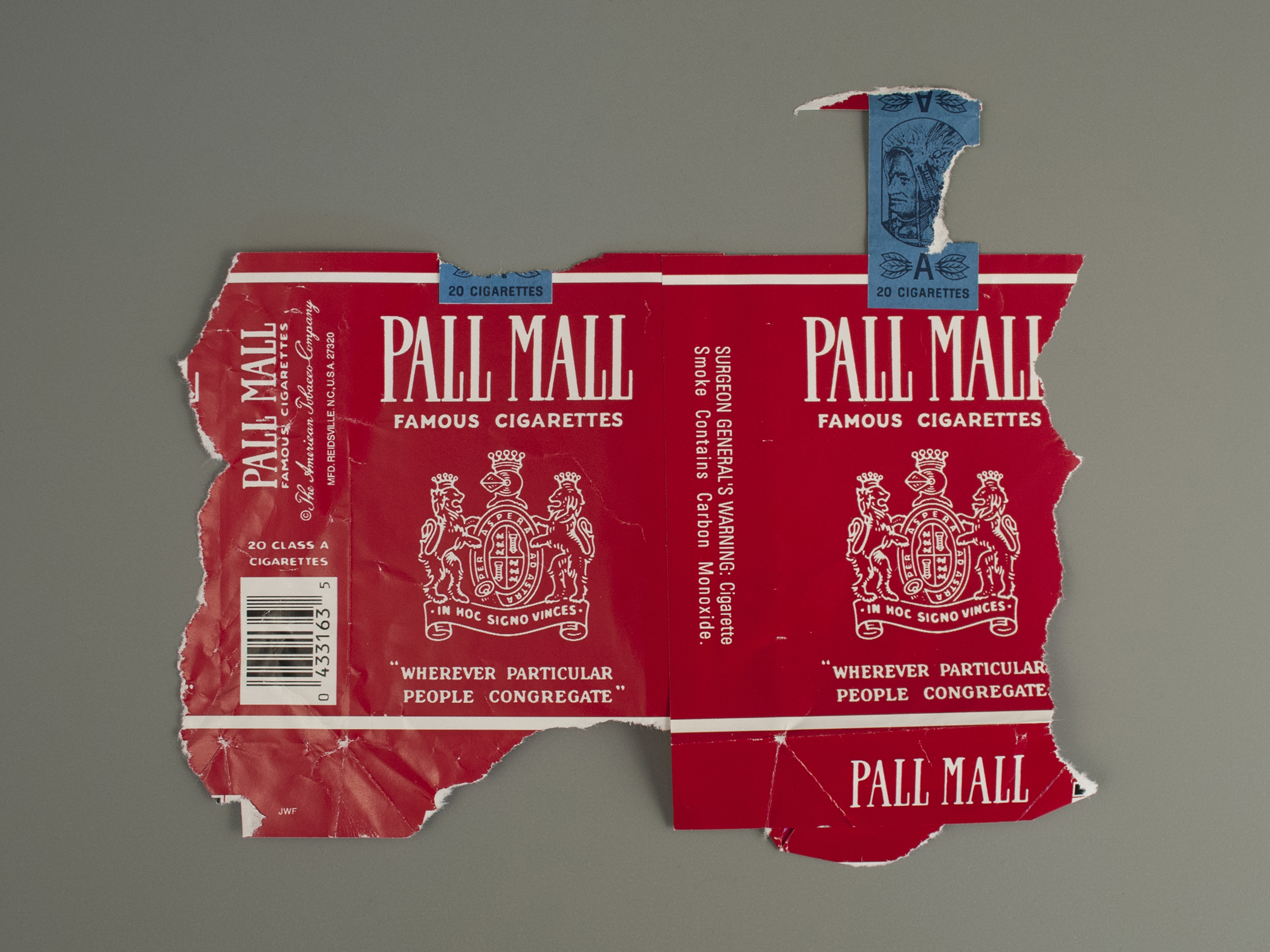Pall Mall Cigarette Pack
New York City, 1995

This object reveals much about the plasticity of memory—mine in particular.
In 1995, Kurt Vonnegut Jr. allowed me to interview him for my book-in-progress, Future Perfect: How Star Trek Conquered Planet Earth.
Approaching his midtown brownstone, I suddenly felt self-conscious about arriving empty-handed. Vonnegut had a huge influence on my life and writing, and he deserved a gift. But I didn’t want to be late—and the only shop in sight was a florist. I assembled the most masculine-looking bouquet I could, and knocked at Vonnegut’s door.
A housekeeper answered, Vonnegut himself close behind. He accepted the flowers, clearly flummoxed by my gesture, and asked the domestic to put them in a vase. We moved upstairs to his study and, surrounded by pillars of books, spoke about the strange global appeal of Star Trek. Vonnegut believed that the longing for community is as strong a human need as Vitamin C; there was little motivational difference, at core, between people who came together around Star Trek, the Grateful Dead, or even Charles Manson. Everyone, he said, just wants to belong.
Vonnegut chain-smoked during the entire interview. When he finished the pack, I asked if I might have it. He shrugged, flattened it out, and slipped it between the pages of a book I’d brought for him to sign: a 1st edition of Slaughterhouse-Five.
As we were wrapping things up, we heard the downstairs door open. “Hi, I’m home!” It was Vonnegut’s wife, the photographer Jill Krementz, calling from below. Vonnegut appeared stricken. “Oh no,” he said. “Her one-woman show in Chelsea is
opening tonight, and I totally forgot.” He shook his head in self-disgust.
A few seconds later, Jill called out again: “Sweetheart! Thank you for the flowers! They’re beautiful!”
Kurt Vonnegut’s face lit up with surprise and delight. “I love you,” he whispered.
* * *
That is my memory of what happened. That is the story I’ve been telling myself, and my friends, for years. The problem is, I never bothered to read my own book (published in 1999) before launching into that touching and self-serving anecdote. After writing this chapter, though, curious about whether I’d included the story in Future Perfect, I opened the book. Here is a scene from that chapter, called The Skin of a Toy Balloon. Vonnegut and I had completed our interview, and left his study. He was giving me a tour of the brownstone. As we stopped in the dining room to look out into the back yard….
…There’s a rustle in the hallway, and Vonnegut’s wife—the photographer Jill Krementz—walks in. She has the wide-eyed, kinetic energy of someone who’s just sat on a tack. Jill spies the bouquet of flowers, runs up to Kurt and throws her arms around his neck. “You are soooo sweet,” she croons. She turns to me. “Tonight’s my first gallery opening in twenty-two years.” Back to Kurt: “It was so thoughtful of you to remember.”
Vonnegut narrows his eyes, his mouth a curve of ironic amusement. “They’re from him,” he confesses.
That is what actually took place that afternoon in New York City. Isn’t that interesting? Kurt Vonnegut Jr. did not panic; he did not take credit for the bouquet; he never told me he loved me. My brain, combing back through approximate facts, created a better story. And though I was disappointed to be chastised with the truth, I’m glad that I was.
But now, reflecting on all the stories in this book—on all the stories I’ve ever told—I wonder. All of my memories seem clear, accurate, visceral. But I wonder.
